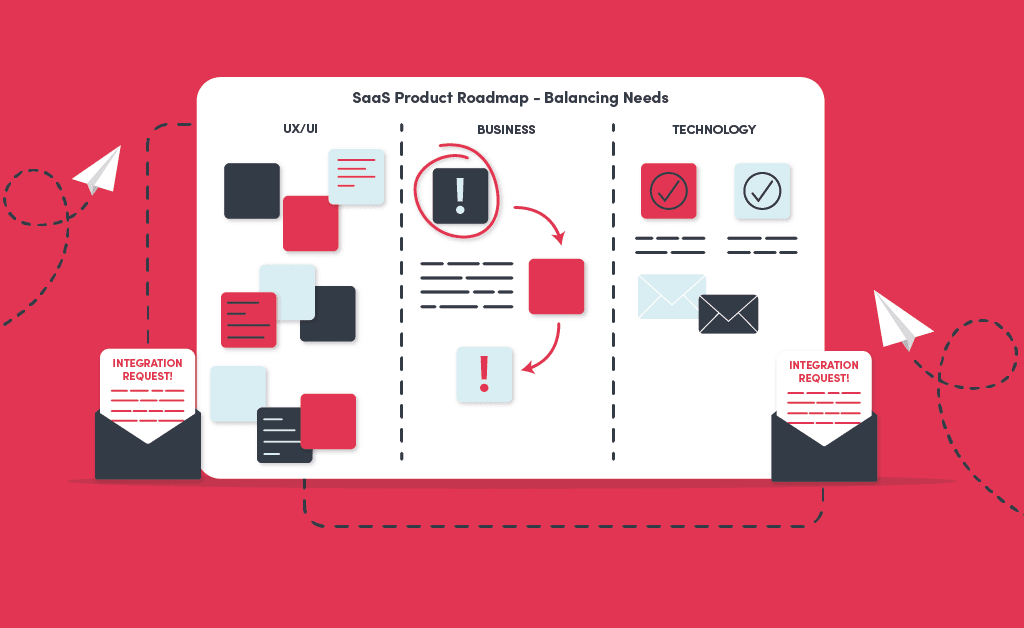
When I joined Cyclr, a B2B software company, it took time to learn the product, understand how it worked and the purpose it fulfilled for our customers. So to continue my learning about SaaS companies and SaaS product development I looked into the challenges product managers face.
I imagined just like with any job there are challenges product managers face, but they do, depending on the size and scale of your SaaS, have a unique juggling act to balance.
SaaS Product Managers
The typical responsibilities of a SaaS product manager entail the definition and scoping of a product’s features. They incorporate a company’s objectives into the product roadmap and give developers and designers the requirements they need to deliver strong features.
Martin Eriksson defines product management “as the intersection between the functions business, technology and user experience,” and that they are “experienced in at least one, passionate about all three, and conversant with practitioners in all.”
Ultimately, product managers need to be flexible and have the ability to balance these three elements to make decisions that keep the product in line with the SaaS business’ objectives.
Challenges SaaS Product Managers Face
SaaS product managers face numerous challenges when balancing the business, user experience and technology needs of a SaaS business.
Navigating the Roadmap
Firstly, prioritising the product roadmap is a big challenge. The product manager needs to decide what to build, when and how they can tackle key user problems, business needs and technology requirements. Their roadmap can be derailed by numerous aspects, such as a lack of resources and customer integration requests steering the product development team away from the core product.
With unscheduled delays, it can make forecasting accurate time estimates for feature development on the product roadmap difficult. As developers are unsure of how long a ticket will take to complete. Resulting in the expectations from the leadership team being delayed and needing to know what a realistic delivery date for a feature actually is.
Blocked by Silos
Another big challenge in product management is breaking down an organisation’s silos. For instance, R&D, Sales and Operations. The SaaS product manager needs to align teams within an organisation to make sure everyone is on the same page and to understand what they are doing.
This ultimately helps to establish a smooth company-wide process for product development and a company’s culture. Companies who wish to unify teams, and remove silo mentality often adopt a DevOps culture. This has a focus on constant communication between different departments and establishing smooth company-wide processes.
Movements in the Market
Highly competitive markets are also a product manager’s pain point. It is important for a product manager to be reactive to the market but not let it take over a proactive approach to what is important to the business.
Focusing on their customer’s needs and real-time market feedback can help develop the product. Ultimately knowing what your end users or customers want can define a great product and help it stand out in the competitive SaaS marketplace.
Not only is the market highly competitive, but it is also continually changing. SaaS product managers need to be flexible in their approach and able to change and respond with an agile mindset.
Scoping a product is a challenge for product managers. They need to scope the product which involves understanding what the business, technology and user experience needs are and explaining the need to prioritise resources. This is where sprint planning is crucial for a product strategy. In every two weekly sprints, it allocates needs, time and resources to further develop the product.
Process Paralysis
Finally, not having a system of automated processes or integrations between teams to help with the SaaS applications development is a challenge for product management.
As mentioned before a lack of resources can trickle down to hinder major product development. Implementing automation processes early can help overcome this challenge, and help with continuous development, integration and communication between teams.
Overcoming SaaS Product Challenges
A SaaS product manager’s role continuously evolves, they juggle many tasks and depending on the size of the SaaS company they may also wear many hats. Overcoming these big challenges will be something that happens as the business grows, increases resources, implements new automated processes, and develops an established culture to aid the product development process.
Sharing with Stakeholders
What some product managers found helped them to overcome some of the common challenges they faced including sharing the roadmap and decision with teams. Helping teams to understand why certain decisions were being made or prioritised.
Others also mentioned that developing a culture or team spirit helped with collaboration and communication. Driving people to help each other and deliver the best results possible for end users. When a team feels that they can communicate with leaders more ideas are shared and considered further down the line. Recognising a team member’s contribution can help motivate them.
Embracing Automation
Developing automated integration processes helps as they are scalable when managing multiple applications, all while remaining consistent. Teams have a better understanding of the product due to having access to data about product performance from end-users. Thus being able to develop a strategy to solve any pain points or errors occurring.
SaaS product managers are balancing many aspects and ultimately need to be efficient and highly skilled communicators to articulate what multiple teams want, and how feasible needs are in line with the business goals.